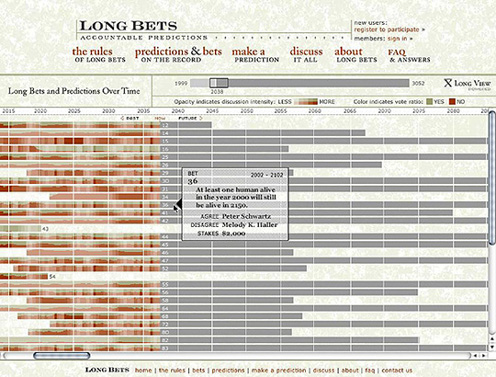![]()
Open Source Timeline Tool

Sponsored by: Foundation for
the Future
The open source Timeline Tool or Longviewer was designed as a server side tool for showing a series of events over centuries and millennia.
We currently have two examples of this tool working now: One using our Long Bets data and another using 10,000 Years of Biotech History. Long Now plans on completely integrating this tool with Long Bets in the near future as well as using it for other projects. We encourage you to download it, use it, extend it, and comment on it within the parameters under the BSD license.
The data, colors and style of the timeline are all configurable with basic text style sheets (see tech and implementation spec written below) The visualization has several features not found in other timeline tools. First it has a moving "now" point that is synched to the server clock it is running on. Events to the left of the "now" point are shown in color while the events in the future are grayed out. Events can be depicted that take place over a period of time with a long bar or as a moment with a diamond shape. The tool can also send reminder emails, if configured properly, to defined addresses as the "now" line moves over events.
The timeline tool can also show two axes of metrics about the events depicted. Shown in the Long Bets example the bet graphs to the left of the "now" point depict a graph of varying height and color saturation. These elements show the voting status of each bet as well as the discussion intensity. These metrics can be configured in the tool to show any quantifiable data.
For navigation there is a bar at the top to show where you are on the timeline. For finding out more information about each event on the timeline there is both a rollover summary, as well as a hotlink that can take you to a page showing more data about that item.
Tech data and implementation data here.
Download link here. (gzip tarball with readme, license and example files)
- Press on this software:
The Timeline project was conceived by Stewart Brand, designed by James Home, coding by Dan Mosdale, technical supervision by Kurt Bollacker, project management by Alexander Rose, and funding from The Foundation For the Future.